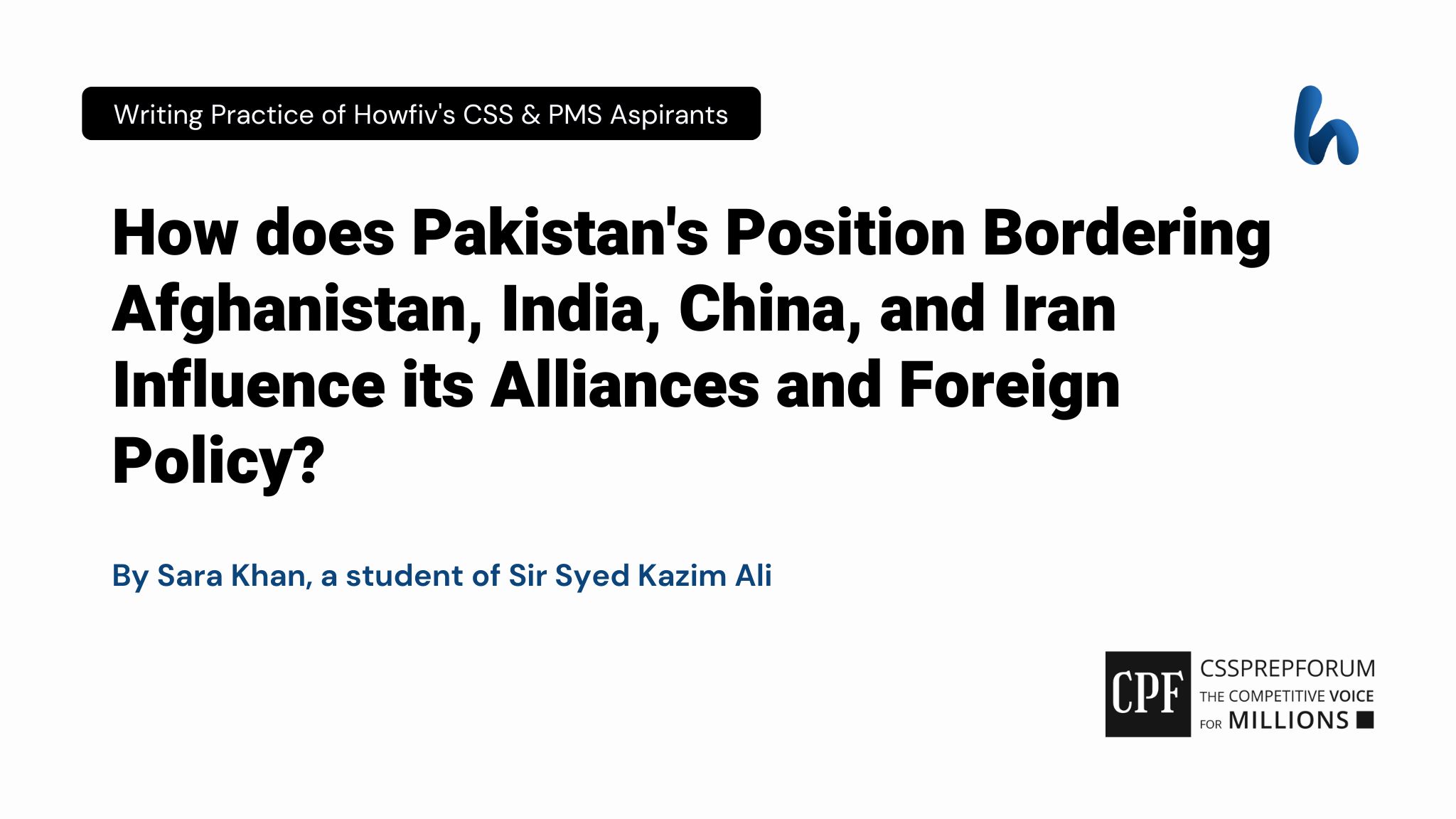Pakistan’s Education System Analysis | Daily Writeups | Opinions
The following article, “A Detailed Analysis of Pakistan’s Education System”, is written by Safina Naz, a student of Sir Syed Kazim Ali. Moreover, the article is written on the same pattern, taught by Sir to his students, scoring the highest marks in compulsory subjects for years. Sir Kazim has uploaded his students’ solved past paper questions so other thousands of aspirants can understand how to crack a topic or question, how to write relevantly, what coherence is, and how to include and connect ideas, opinions, and suggestions to score the maximum.

Education plays a vital role in the socio-economic development of a country. It acts as the strongest pillar that helps a country reach the highest echelon of prosperity and stand out in the comity of nations. A prime example is the United Kingdom, which has achieved remarkable success by focusing on education. However, Pakistan has failed to reach the heights of glory due to the flawed education system. The country has not been able to provide the education sector with due significance since its inception. Multiple persistent challenges to the education system have hindered its success, eventually leading to the downward trajectory of the education system in Pakistan. However, as the old saying goes, where there is a will, there is a way. Pakistan can also march towards progress by working on improving the education sector. This would lead to increasing literacy rates in the country, character building of students and the country’s overall economic growth. The education system can be improved by investing in quality education, promoting teacher training, and ensuring that education policies align with the changing needs of the present times. In conclusion, it is high time for Pakistan to overcome the flaws of the education sector and focus on improving the education system. The benefits of an improved education system are manifold and essential for the country’s progress and development.

Moving down in depth, it is essential to glance at Pakistan’s education system. Pakistan’s education system comprises six levels: preschool, primary, middle, secondary, intermediate, and higher education, leading to a graduate degree. According to the Economic Survey 2021-2021, the literacy rate of the country was 62.8 per cent with the literacy rate in Punjab, Sindh, Baluchistan, and Khyber Pakhtunkhwa as 66.3, 61.8, 55.1, and 54.5, respectively. The data depicts that 40 per cent of the population is still illiterate, pointing towards the failure of the education system. Indeed, several factors are responsible for the high percentage of the illiterate population. However, the government can turn the tide by considering viable solutions and implementing them in true letter and spirit.
Stepping into the depths of Pakistan’s education system, multiple driving factors have pushed the education sector towards the quagmire of failure. Among them, budgetary constraint is at the top of the list. Successive governments have failed to provide sufficient budget to the education sector, leading to poor infrastructure and sub-standard education. Further, the shortage of adequate budget has deprived many children of school, thus increasing the illiteracy rate in the country. According to the Economic Survey 2023-2024, the total budget allocated to the education sector is 97.098 billion dollars, constituting 1.7 per cent of Gross Domestic Product GDP. The allocated budget is like a drop in the ocean, unable to meet the demands of a rapidly growing population. Hence, a limited budget is, so far, the most prominent challenge for Pakistan’s education system.
Further, the monster of corruption is weakening the roots of the country’s education sector and affecting its growth. The malady of corruption equally plagues the appointment of teachers, examination systems, and administrative matters. According to the research carried out by Dr Sharmila Tariq, “Corruption prevails in the education sector of Pakistan in the form of disclosing personal information of students before others, changing test results by using authority, making fake educational degrees, using personal influence at the time of admission, and inappropriately distributing government grants to the educational institutions.” This situation is a stark example that corruption has hampered the growth of the education sector, leading to the decreasing trust of the masses in educational institutions. Furthermore, bribery received by invigilators during invigilation has normalized the use of unjustified means in students’ minds, eventually leading to the downfall of moral values in the young generations. Corruption is thus a most pertinent hurdle that masks educational institutions’ upward growth and tarnishes the education sector’s image at the international level.
In addition, the appointment of less educated teachers on low salaries has further downgraded Pakistan’s education standard. Undoubtedly, teachers make the firm foundation of a nation; however, Pakistan is facing the most considerable trouble in the form of less educated teachers who barely focus on the character-building of students. According to the United Nations Educational, Scientific, and Cultural Organization (UNESCO) report, “Low-level teachers are identified as the crux of the educational problem in Pakistan.” Low-profile teachers are appointed on low salaries to meet the increasing demand for teachers, leading to a decrease in the standard of education in institutions. The sole purpose of such teachers is to make money rather than work on the students’ character-building. Hence, appointing low-quality teachers on minimum salaries is a prominent flaw in the education sector.
Besides this, a blend of different institutions, namely private, public, and Deeni madras, have hampered the country’s education system. Verily, the students enrolled in these institutions have entirely different mindsets based on the standards of institutions and their teachers’ level of teaching, eventually creating a rift among the people and dividing the nation at the fundamental level. According to Pakistan Education Statistics 2017-2018, “At the national level, 35 per cent of middle school students study in the public sector and 65 per cent study in the private sector.” This number game clearly indicates that most parents prefer their children to enrol in private institutions. Furthermore, looking at the bigger picture, students learning in the public sector cannot compete with students from private institutes for job opportunities; sadly, this has increased unemployment in the country. Therefore, the roots of the flawed education system are entrenched in the lack of uniformity in institutions.
Above all, the most important loophole lies in the outdated curriculum, which has been functional in institutes since the inception of Pakistan. Speaking straightly, the outdated curriculum has produced generations of handicapped learners having no skills at all; schools have produced bookworms who cannot think out of the box and fail to delve into real-world problems, leading to a lack of innovation and advancement in research and development in the country. According to the research carried out by the Sustainable Development Policy Institute (SDPI), “Pakistan’s curriculum focuses on rot learning, leaving a little room for critical thinking.” As a result, the students fail to thrive in the changing world. Therefore, the decades-old curriculum has left the education system in turmoil, curtailing the potential of coming generations and making the country lag in innovations and development.
As there is always some hope that propels the country towards prosperity, Pakistan’s education system can also prove to be a beacon of progress if the education sector advances in the right direction. First, allocating the appropriate budget for the education sector will help decrease the country’s illiteracy rate; increasing the budget will ultimately reduce the number of children out of the schools. As an illustration, according to the Trading Economics, “France has allocated 5.24 per cent of the budget to education.” Similarly, Pakistan has to resolve the primary issue by investing in education, providing financial assistance to poor children, and working for the betterment of the infrastructure of the institutes. Ultimately, this will decrease the number of out-of-school children and increase the country’s literacy rate.
Exploring the plausible solutions further, resolving the governance-related issue of the education sector will alleviate the institutions’ corruption. Hopefully, students studying in a corruption-free environment will become an excellent asset for the country as they hold its future. According to the United Nations Office on Drugs and Crime, “Corruption in the education sector can be eliminated by a physical audit of the education process, public expenditure tracking survey, and tracking comparison between reported and actual performance.” These checks in the education sector will lead to the actual investment in education, thereby paving the way for the growth of education sectors. Such an education system, in turn, will produce honest youth. Therefore, curbing corruption in the education system will bring fruitful results for the country.
Moreover, if the teachers are appointed based on their capabilities, they will work effectively for the character-building of students. As said by scholars, to have a peaceful society, it is a pre-requisite to have a nation that is ethically and morally groomed, and teachers are undoubtedly torchbearers in the character-building of students. Therefore, having highly qualified and passionate teachers will produce morally groomed and mentally strong students. Singapore is a stark example where teachers are considered the cornerstone of the education system. According to the National Center on Education and Economy, “The process of appointment of teachers in Singapore is very selective, and it is carried out under the National Institute of Education.” Moreover, Singapore appoints teachers with high remuneration. Likewise, teachers of Pakistan’s education system can positively bring a change if highly qualified teachers are appointed on merit.
In addition, unity among students at the school, college and university levels will lead to national integration. Undoubtedly, the country is facing a severe crisis in the form of an ethnic-lingual divide, and schools are providing a base for an ethnolinguistic divide as superiority based on language and ethnicity exists in institutions. Hence, if the education sector unites all ethnicities under the umbrella of Pakistan, it will strengthen national integration. The Single National Curriculum (SNC) policy is one step in the right direction. According to the Ministry of Federal Education and Training 2020, SNC aims to provide all children with equal higher education opportunities and upward social mobility, promoting national unity. So, taking further steps towards uniting children at the institutional level will create a sense of togetherness in them and eventually strengthen national integration.
Lastly, investing in Research and Development (R&D) in the education sector can benefit the country’s economic development, as it is a significant element in boosting economic growth and addressing real-world problems. In this case, Pakistan can get direction from Switzerland, as according to the Global Innovation Index (2023), “Switzerland retains the topmost position among all for the thirteenth consecutive year in this index, showing its tremendous investment in research and development.” Indeed, this is the reason behind Switzerland’s exponential economic growth; likewise, investing in research and development will open the doors for innovation and, consequently, provide more employment opportunities for Pakistani people.
To evaluate critically, the education sector is the driving force that propels a country towards prosperity. Sorrowfully, Pakistan has failed to get the most out of its education sector, as it has been grappling with multiple challenges since Pakistan’s inception. However, the country’s future seems promising, as a ray of hope is still seen in the form of viable suggestions at all levels. Therefore, resolving the problems of the education sector will result in increasing literacy rates, strengthening national integration, and increasing the country’s economic development.
Concluding the above matter, the education system in Pakistan is currently in shambles. The country has been continuously struggling with its education system, failing to decrease the number of out-of-school children raised due to multiple challenges, severely impacting its growth. However, as every cloud has a silver lining, Pakistan can turn the tables and win the game through specific, pragmatic approaches, such as appointing highly qualified teachers on high salaries and increasing the annual education budget. In conclusion, it is high time Pakistan made the best moves to bring the education system out of the maze of multiple challenges. Overcoming the challenges will help Pakistan advance towards growth and development.

CSS Solved Past Papers’ Essays
Looking for the last ten years of CSS and PMS Solved Essays and want to know how Sir Kazim’s students write and score the highest marks in the essays’ papers? Then, click on the CSS Solved Essays to start reading them.
CSS Solved Essays
CSS Solved General Science & Ability Past Papers
Want to read the last ten years’ General Science & Ability Solved Past Papers to learn how to attempt them and to score high? Let’s click on the link below to read them all freely. All past papers have been solved by Miss Iqra Ali & Dr Nishat Baloch, Pakistan’s top CSS GSA coach having the highest score of their students. General Science & Ability Solved Past Papers












